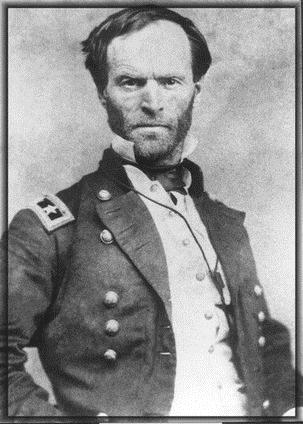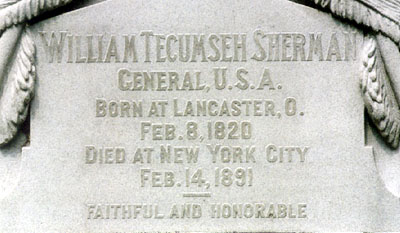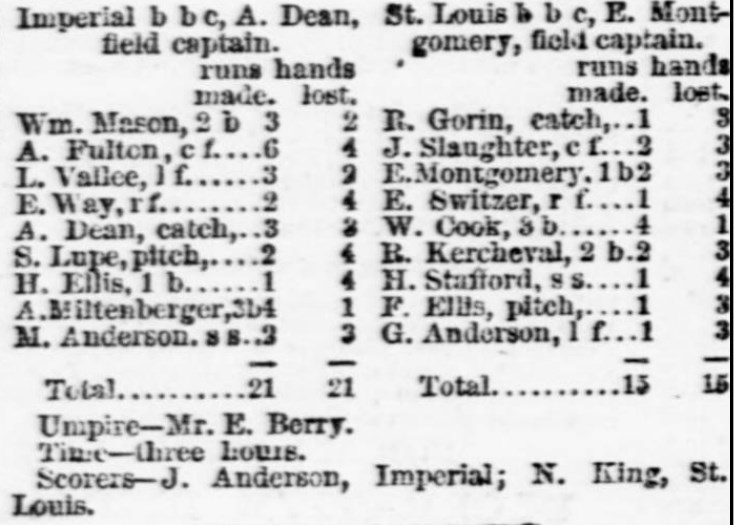A spirited game of base ball was played yesterday on the grounds of the Baltic club, between the Peerless and the Atlantic clubs, in which the Peerless were the victors, the score being 33 to 24.
-Missouri Republican, June 6, 1870
|
There's nothing in the Republican regarding St. Louis clubs following the visit by the Chicagos until this squib in early June. However, Tobias does mention a few other games during that period, specifically a match between the Lone Stars and the St. Louis Club on May 1, a match between the Aetnas and the Atlantics on May 22, and a match between the Aetnas and the Unions on May 26. So we know that there was baseball being played in St. Louis during May of 1870 but, for some reason, the Republican was not covering it.
0 Comments
The game played last Sunday between the Resolute and St. Louis Base Ball Clubs, for a silver ball, offered by Mr. Solari, of St. Louis Base Ball Park, was won by the Resolutes. Score, 33 to 22. It's great to find some information about baseball in St. Louis in 1868 that doesn't involve the Unions or the Empires. Baseball in the city at this time was more than just those two clubs or just the clubs that were members of the state association. I understand that those were the big clubs, they played the big games, drew the big crowds, and it was natural to focus coverage on them. But I love to find stuff about the smaller clubs because it gives us a fuller picture of what was happening in St. Louis during the period. The game was popular and there were clubs like the Stonewalls and the Adventures playing all of the time. Their games just generally weren't covered during this period and that's kind of a shame.
A match game of base ball came off on Thursday afternoon, between the Laclede and Young Commercial Base Ball Clubs, which resulted in a victory for the former. So we have a couple of games, another reference to the St. Louis Club and the first known reference to the Missouri Club. That's great. Let's talk about Sherman. On the day that this all appeared in the Republican, William Tecumseh Sherman began the Atlanta campaign, which was the prelude to the March to the Sea. Sherman happened to have been a baseball fan. In 1874, while serving as General of the Army, he moved his headquarters to St. Louis and, while living in the city, was known to frequent the Grand Avenue Grounds. The Union Club noticed this and named him an honorary member. So, officially, Sherman was a member of the Union Base Ball Club of St. Louis. He also happened to have been living in St. Louis at the beginning of the war and witnessed the Camp Jackson Massacre. Sherman loved St. Louis, owned a house on North Garrison, and, while he moved around quite a bit during his life, always seemed to return here. His wife was buried at Calvary Cemetery in 1888 and it was Sherman's wish to be buried next to her. Edmund Tobias described Sherman as "that grim old warrior" and I just love that. He's the man who coined the phrase "War is hell." You've no doubt heard that but you need to read the whole quote: I am tired and sick of war. Its glory is all moonshine. It is only those who have neither fired a shot nor heard the shrieks and groans of the wounded who cry aloud for blood, for vengeance, for desolation. War is hell. There is nothing ironic in Sherman's quote. War IS hell and he knew that as well as anyone. How can you not love this guy?
A match game of Base Ball was played yesterday afternoon, between the Imperial and St. Louis Base Ball Clubs, which resulted in a complete victory for the former. I have a box score from 1862 that includes the Imperials but no players in that box score matches players in this box score. So I'm not absolutely certain that the 1862 Imperials are the same club as the 1864 Imperials. My gut feeling is that they were two different clubs but I have no evidence either way.
The St. Louis Base Ball Club is absolutely a new club or, at the very least, this is the first reference I've seen to them. I think St. Louis is a great name for a baseball club from St. Louis but what do I know. I've always wanted the Blues to trade for Martin St. Louis so we can all buy Blues jerseys that say St. Louis on the back. That would be, without a doubt, the best selling jersey in the history of the Blues. Three days after this match was played, the Battle of the Wilderness began. The Wilderness was a brutal affair, as Grant threw his army at Lee's, and, when the battle ended on May 7th, combined casualties stood near 28,000. In the past, when faced with such casualties, the commander of the Army of the Potomac would retreat. Grant, realizing that his army could sustain those kinds of losses while Lee could not, kept moving south. That was Grant's genius. He knew he had the bigger army and he would continue to engage Lee's smaller army until it was destroyed. It resulted in horrific casualties but, in the end, it won the war. |
Welcome to This Game Of Games, a website dedicated to telling the story of 19th century, St. Louis baseball.
Search TGOG
Categories
All
|





 RSS Feed
RSS Feed
